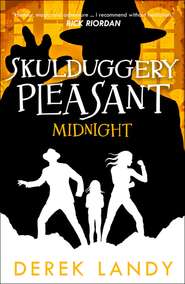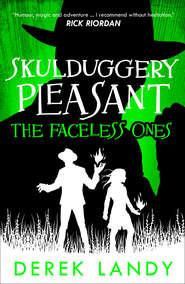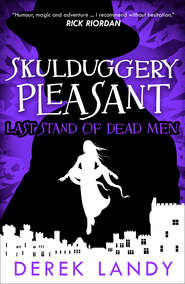По всем вопросам обращайтесь на: info@litportal.ru
(©) 2003-2025.
✖
Desolation
Настройки чтения
Размер шрифта
Высота строк
Поля
“I’ll heal. I’ll heal by myself.”
“Your fingers need to be reset. If we leave them, they’ll heal wrong. We need a doctor to do it right. I’m sorry. You have to do this.”
She tried arguing, but no words would come. Milo was right. She knew he was.
She reverted. The transformation itself, the shortening of all the bones in her body, both broken and intact, made her cry out.
But now the true pain came at her. No longer blocked by her demon form, it rushed at her all at once and burst behind her eyes. Her vision swam and the world tilted, but instead of falling to the ground she was lifted off her feet. The last thing she was aware of was Milo carrying her to the door, and then she blacked out.
(#u49759488-634d-5d0c-9fd9-7feb56fa9885)
WHEN THE NIGHT FINALLY slouched its way across the horizon, Virgil was there to greet it grudgingly, his old bones shivering in the chill. There was a time, long ago, when he would have looked forward to the night, back when he could spend it sleeping soundly. There was a time, even longer ago, when he could have spent his nights doing other stuff, too – drinking and carousing and getting into trouble.
These days, the only trouble he got into was when his thoughts got mixed up in his head, and the only sleep that came to him was light, irritated and sparse.
How many times had he made the trip to the bathroom the previous night? Five? Six? Pretty soon he’d need to keep a bedpan close by, just to make sure he didn’t embarrass himself. Either that or just bite the damn bullet and check into one of those retirement homes, places with Lodge or Manor or Tranquil in their names. God’s Waiting Room would be more apt.
Even though they were headed into summer, he turned up the heat on the thermostat. There was cold, he’d found out, and then there was Alaska cold. He didn’t like being cold. Never had. He was a California kid, born and raised in the sun. And here he was, living out his winter years in goddamn Alaska. Was it smart? No, but then neither were the decisions that had brought him here.
His house was a shrine to the life he’d once led. His awards, all five of them, took up two shelves in the display cabinet. The movies he’d been in – cheap things, mostly, aside from Inferno at 30,000 Feet – were documented in the framed posters on the walls, but it was his TV work for which he’d won the greatest acclaim. A cult hit before anyone knew what a cult hit was, When Strikes the Shroud had brought werewolves and vampires and terrible gypsy curses into the living rooms of America for three wonderful seasons in the early 1970’s and, in the centre of it all, had been Virgil Abernathy, playing the eponymous Shroud, the masked, besuited, two-fisted seeker of truth in a world mired in nightmare.
Three glorious years. Talk of a movie. And then tastes changed and attention spans wandered and the Shroud was at last felled – not by killer or crazy or creature, but by ratings. Or rather the lack of them.
Not that he was bitter. Not that he allowed thoughts of what might have been to intrude upon his daily life. Not that he allowed himself to dream of yesterday instead of facing up to his mistakes of today, which were legion. No, none of that for Virgil Abernathy, once a hero to boys of every age and a seducer of women. No, to Virgil Abernathy there was only today. There was only the cold emptiness of today in a town that had never particularly wanted him, in a life that was growing ever more tired of him.
“Maudlin nonsense,” he muttered to his cold, quiet house.
And what had they replaced him with, he wondered (and not for the first time)? A quick perusal of the TV channels answered that little question. Reality television and twenty-four-hour news. Game shows and competitions where all your dreams came true if the people at home liked you enough to vote. Rich people doing ugly things. Poor people doing stupid things. And the shows? The scripted shows? Populated by actors with sharp cheekbones who did nothing but smoulder or grimace in equal measure. Where was the art? Where was the substance? He flicked over to a commercial for a pill whose never-ending list of possible side effects included death, then turned off the TV.
His doctor had told him, for the sake of his heart, not to cause himself any unnecessary agitation. But then his doctor was an idiot.
Virgil turned off the lights. Time for bed. Another day over with. Another one under his belt. He was building up quite a collection. Had more days than he could count. He wasn’t quite sure what he would do with them, once he’d collected them all. Maybe he’d set them free. Maybe he’d go to Edison’s Shard, the rocky outcrop overlooking the disused quarry in the hills behind his house, and throw the days to the wind, watch them flutter and fly and disappear. Or maybe he’d just stuff them in a jar and bury them in the backyard. Either one would suffice. No one would be using them again.
He was headed for his bedroom, but stopped, as he always did, by the window in the living room, and peered through the curtains. He glowered at the house beside his, with its porch lights that blazed with the force of a thousand suns every time a damn grizzly wandered into the backyard. How many times had he complained to that damn fool Snyder? In his younger days, there was no one who would dare say no to him, not when Virgil’s ice-blue eyes started to narrow. But that was then, and things had changed. Robert Snyder was a man in his forties, singularly unimpressive and a convicted felon to boot, and yet he felt confident enough to smirk away Virgil’s complaints. A boor of a man.
Virgil could see him right now, watching TV. Kimmel or Fallon or one of those. They were all the same to Virgil. Monologuers, the lot of them. Snyder sat in his undershirt with a beer in his hand. He looked warm. Virgil despised him.
He was just about to let the curtain fall back when movement caught his eye. There was someone else in the house.
Snyder had been married, but they’d split three years ago and she’d moved across town, back in with her mother. What was her name? It didn’t matter. What mattered was that, since Snyder’s wife had left him, Virgil had never seen anyone else in that house. No women, no friends, no one. No one but Snyder. And now this … this shape.
He was tall, whoever it was. Thin, too. He moved past the windows quickly but without urgency, from dark room to bright room to dark room. Virgil lost track of him and frowned slightly, wondering why he was still watching. Who cared if Robert Snyder had made a new friend? Virgil certainly didn’t.
Snyder drained the last of his beer and stood, scratched his expansive belly, and walked into the kitchen. He stood at the sink, looking at his reflection in the window, unable to see Virgil in his darkened house directly across from him. He washed out the empty beer bottle. Recycling. Well, he wasn’t all bad.
The visitor, whoever he was, came into the kitchen. He was pale, his skin a funny colour, and his mouth was wide. Very, very wide. He walked up behind Snyder and grabbed him.
And then snapped Snyder’s neck.
Virgil’s heart lurched in his chest and he ducked down. He didn’t know why he ducked down, he just did. Ducking down seemed like the thing to do. But now that he had, he was finding it hard to straighten up again. He half waddled to the bookcase, moving away from the window. His legs were burning, the treacherous things. When he was in the clear, he straightened up slowly, groaning as his hip popped and his back creaked.
Moving a little easier now, he sneaked to the window once more and peeked out. He couldn’t see Snyder or the figure. Either the killer had dragged him away or else he’d just let him drop out of sight.
Virgil thought about how crappy a neighbour Snyder had been. He had been rude and disrespectful and had threatened Virgil with physical harm on more than one occasion – and, while Virgil had held serious doubts about Snyder’s ability to follow through on those threats, there was no getting away from the fact that Snyder had been a young man in his forties and Virgil was an old man in his eighties with a bad heart. That was not, by anyone’s standards, a fair fight.
But Snyder was not a young man in his forties anymore. He was a body now. A corpse. He was remains. Whatever hopes and dreams he’d ever harboured were gone, evaporated into the ether the moment that figure had laid his hands on him. Virgil felt some sympathy for the guy, but it was the shallow type of sympathy that was easily forgotten and quickly put away.
Movement caught his attention. The figure was walking towards the back door.
Virgil hurried to his own kitchen, banging his leg off a chair in the dark. Cursing all the way to the window over the sink, he peered into Snyder’s overgrown backyard as the figure slipped out into the night. He seemed smaller now, under the moonlight. He had dark hair. That was odd. In the kitchen, Virgil could have sworn he’d been bald. He wasn’t nearly so pale, either, and he wore slacks and a vest over a short-sleeved shirt. The killer glanced his way and two thoughts spiked in Virgil’s head.
The first was, He’s seen me, he’s seen me, he knows I’m here, a thought that faded when the killer’s gaze moved on without stopping, taking in a full sweep of his surroundings.
The second thought was, I know that guy. I know that guy, but it’s impossible. It can’t be him. The guy I’m thinking of is eighty years old and living in Arkansas.
He watched the killer jump the back fence and disappear, then stayed where he was for twenty minutes before he allowed himself to relax. Slowly, his heart stopped beating a tango. The thought occurred to him that it might be a good idea to call the cops. He took his phone from his pocket. The screen lit up, way too bright in this dark house, and he did his best to remember how to work it.
Headlights swept past the window. Virgil moved quickly back to peer out, just in time to see a police cruiser stop in Snyder’s driveway. Relief washed over him. The lights weren’t flashing, but he didn’t mind that, not when he saw Chief Novak step out. Novak was a good cop – strict as hell, but smart and fair. He was with another officer, a big guy – Virgil thought his name might have been Woodbury – and as they walked up to Snyder’s front door he debated whether or not to tell them what he’d seen.
The front door must have been unlocked because the two cops walked right in. Virgil saw them cross the living room, heading into the kitchen, until they were standing where he had last seen Snyder. They looked down and talked to each other. They didn’t seem surprised. They didn’t even seem perturbed. They both bent down and when they straightened up they were carrying Snyder’s body between them.
“Oh, goddamn you,” Virgil whispered, watching them take the corpse out of the house and dump it in the trunk of the cruiser. Woodbury went back to shut the front door, then rejoined Novak and they drove off.
Virgil stood there in his dark house.
“Well, hellfire,” he said.
(#u49759488-634d-5d0c-9fd9-7feb56fa9885)
IT WAS A BRAND-NEW dream, this time.
Amber was back home, in Orlando, and it was hot and muggy and the a/c wasn’t working, but the heat wasn’t affecting her like it usually did. Her brow was cool as she sat at the table and told her parents about her day at school. She hadn’t been bullied and she hadn’t been called in to Principal Cobb’s office, so today had been a good day.
Her parents listened, nodded, smiled with affection, and offered advice and encouragement. Betty set the table while Bill fussed with the oven. He opened the oven door and the heat spilled out and circulated with the already warm air. Dream-Amber started to sweat.
The dream did that fast-forward thing that dreams do, and now they were eating, and talking, and chatting. Bill and Betty remained cool. Amber’s sweat poured down her face and splashed on to her plate, but she was starving, so she finished her food and asked for a second helping. Her parents laughed and Bill took her plate and stood, carving knife in hand. He cut a large slice from the roast, and Amber noticed for the first time that the roast was Imelda, laid out on a large silver tray on the table, garnished and basted and smelling divine.
Bill handed Amber back her plate and she dove in, chewing on the tender meat while blood mixed with the sweat on her chin. It was glorious. Imelda’s skin crackled in her mouth.
Then she realised it was a dream and she woke up.
The first thing she registered was the cold. The second was the happy purr of the Charger as it gently rocked her in her seat. And the third, as she opened her eyes, was the pain in her hands. She lifted them off her lap, wincing but not screaming, which was an improvement. She could only see the tips of her fingers above the thick bandages – they were purple, swollen and sore.
“How you feeling?” Milo asked, keeping his eyes on the dark road ahead.
“Like all my fingers have been smashed,” she replied.
“Not all of them,” he said. “The doctor said your left thumb is badly bruised, but not actually broken.”











